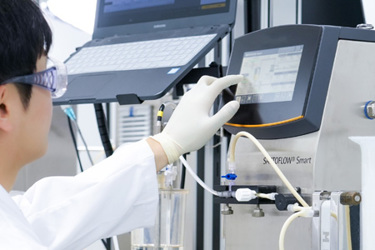Optimizing DSP Development: Faster Timelines, Lower Costs, And High-Quality Processes
By Kyunghwa Cho, Samsung Biologics

As the biopharmaceutical industry advances toward more complex biologic therapies, downstream processing (DSP) has emerged as a critical bottleneck. Efficiently purifying intricate molecules while maintaining product quality, meeting regulatory standards, and adhering to compressed development timelines poses significant challenges. Traditional DSP development, especially resin selection, often relies on empirical testing—an approach that is time-consuming, resource-intensive, and limits speed to market. Resin screening requires evaluating numerous chemistries and buffer conditions through extensive chromatography runs and analytical characterization, delaying development.
To overcome these limitations, the industry is increasingly turning to in silico analysis and data-driven strategies. By leveraging historical data and computational modeling, in silico tools can predict molecular interactions with various resin ligands, enabling more targeted resin selection and reducing the number of experimental runs required. This approach accelerates the identification of optimal purification conditions while conserving valuable materials and resources. In addition, it supports the development of robust, scalable processes that maintain performance and quality from lab to commercial scale.
Get unlimited access to:
Enter your credentials below to log in. Not yet a member of Outsourced Pharma? Subscribe today.
